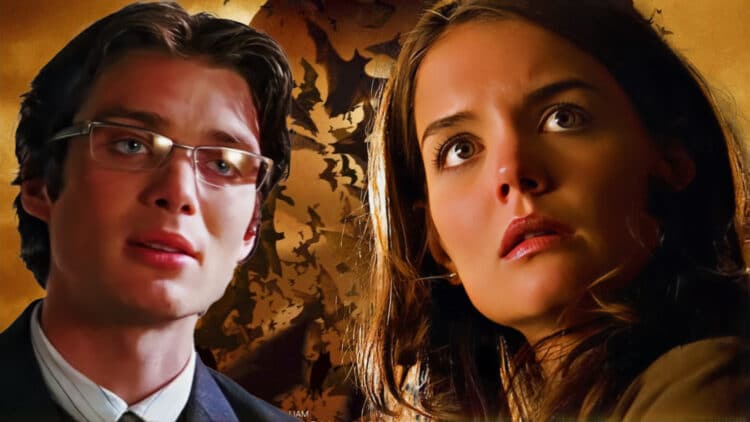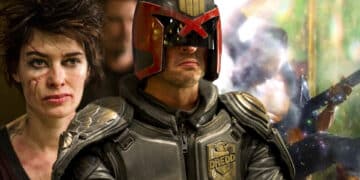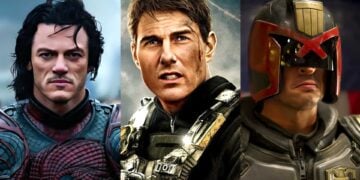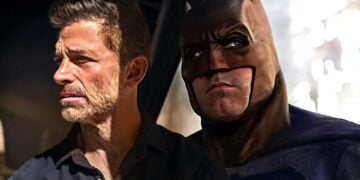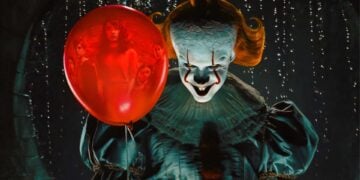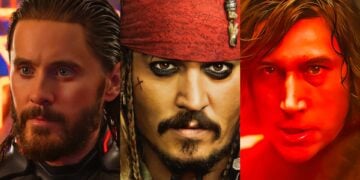In 2005, Warner Bros. and director Christopher Nolan rebooted the Batman franchise with Batman Begins, taking the character back to his dark and gritty roots. Gone were the fantastical production designs and campy aesthetics of Tim Burton’s films. Nolan crafted a Batman story that felt far more grounded in reality, reflecting modern concerns around terrorism and urban decay. Central to this new grounded take was Batman Begins‘ stellar cast. Nolan assembled a group of actors who perfectly embodied the tortured essence of these iconic characters. Christian Bale brought a brooding intensity to Bruce Wayne, capturing his grim determination and commitment to justice. Meanwhile, Michael Caine lent warmth and wisdom to Alfred Pennyworth, Bruce’s loyal butler and confidant.
From Bruce Wayne’s path to becoming Batman to Gordon’s crusade against corruption in the GCPD to Scarecrow’s chilling experiments with fear itself, the actors fully committed to realizing this reimagined Gotham City. Let’s take a look at some of the standouts from Batman Begins cast, and why they might be the definitive live-action versions of these iconic characters!
Michael Caine as Alfred Pennyworth
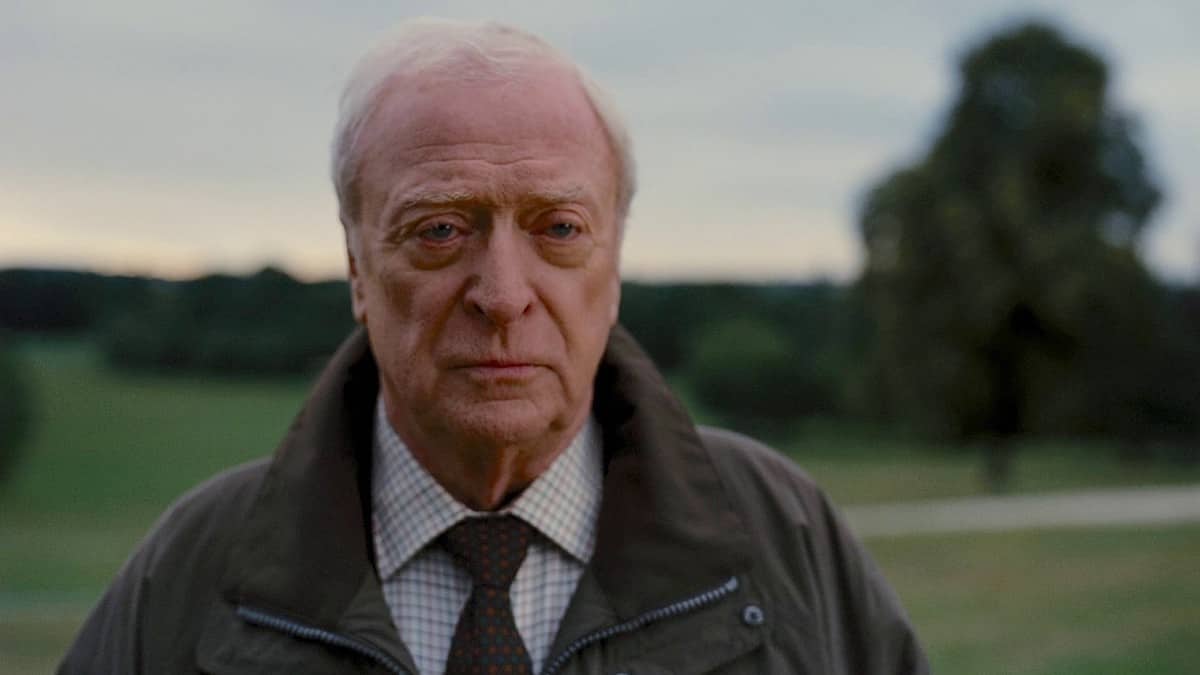
Perhaps one of the most notorious performances in Batman Begins is Michael Caine as Alfred Pennyworth. Whereas previous incarnations of Alfred could feel like a mere servant or valet, Caine brings a new depth and humanity to the role. He portrays Alfred not just as Bruce Wayne’s dutiful butler, but as a father figure and moral center.
When Bruce’s parents are murdered, it is Alfred who steps in to care for the young orphaned boy. Caine’s Alfred acts as a surrogate parent, providing emotional support and guidance as Bruce grows up. Once Bruce decides to become Batman, Alfred serves as his sole confidant, worrying for Bruce’s safety while also enabling his crusade for justice.
Caine’s performance is central to making this reimagined Alfred feel like a real person rather than just background-set dressing. His subtle gravitas and quiet wisdom provide an emotional core amidst the film’s gritty world of violence and corruption. Alfred’s concern for Bruce’s well-being comes through in Caine’s every scene, lending the character a benevolent humanity. He provides a moral voice, encouraging Bruce to stay true to his principles. In many ways, Alfred is the heart of the film, akin to Uncle Ben’s role in Spider-Man – the father figure whose words of wisdom loom over the hero’s journey.
Morgan Freeman as Lucius Fox
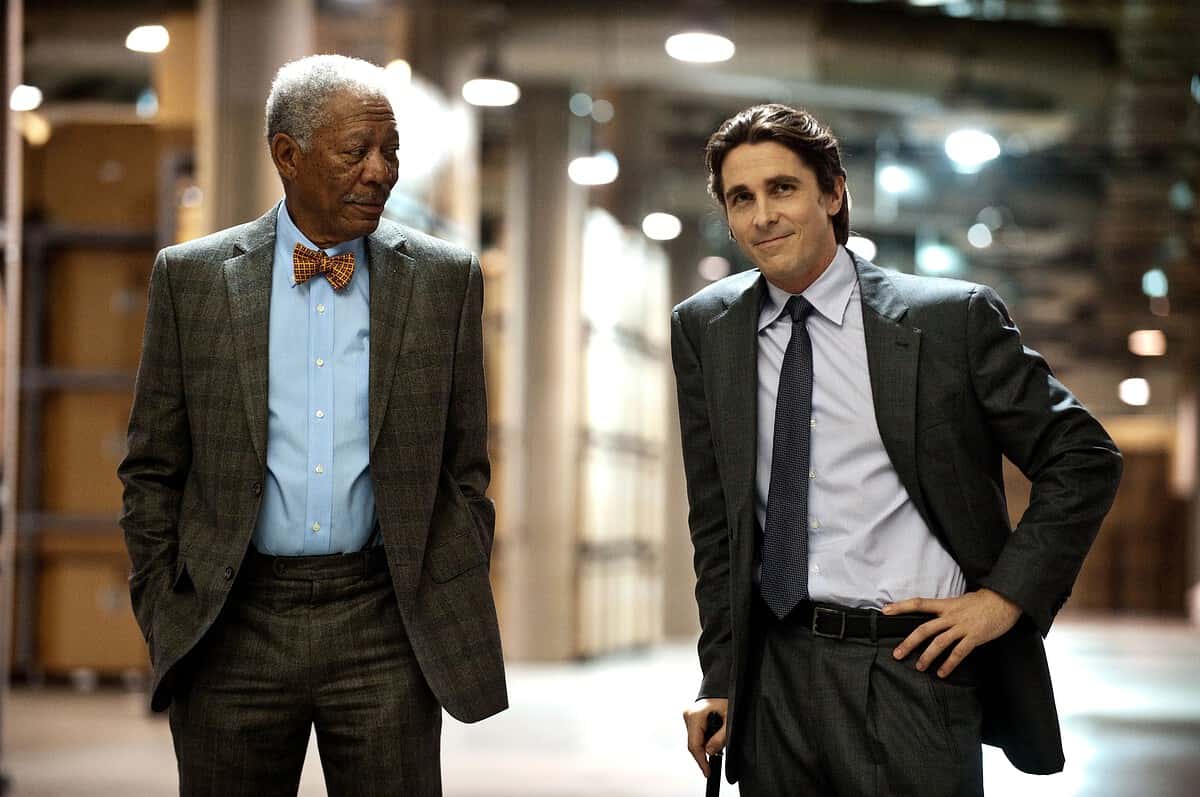
Another standout casting choice in Batman Begins is Morgan Freeman as Lucius Fox. As head of Wayne Enterprises’ R&D department, Fox provides Bruce with the high-tech tools and weaponry that transform him into Batman. Freeman lends the character gravitas and intellect, making Fox feel like an invaluable ally in Bruce’s mission.
Beyond the gadgets, Freeman also brings some brilliant comedic timing and subtle humour to the role. Fox questions some of Bruce’s more outlandish orders, and Freeman delivers these lines with amusing exasperation. He provides moments of levity to punctuate the film’s brooding intensity.
Though Fox has limited screen time in Batman Begins, his scenes leave an impression. Freeman makes the most of every moment, hinting at the depth of Fox’s history and his complicated relationship with both Bruce and Wayne Enterprises. We get a sense that Fox sees true integrity behind Bruce’s eccentric requests, even as he feigns scepticism at times.
In many ways, there wouldn’t be a Batman as we know it in Nolan’s trilogy without Lucius Fox. While we all know that Morgan Freeman is usually relegated to an exposition machine by some directors, Nolan gave him the perfect role when he picked him as Fox.
Gary Oldman as Jim Gordon
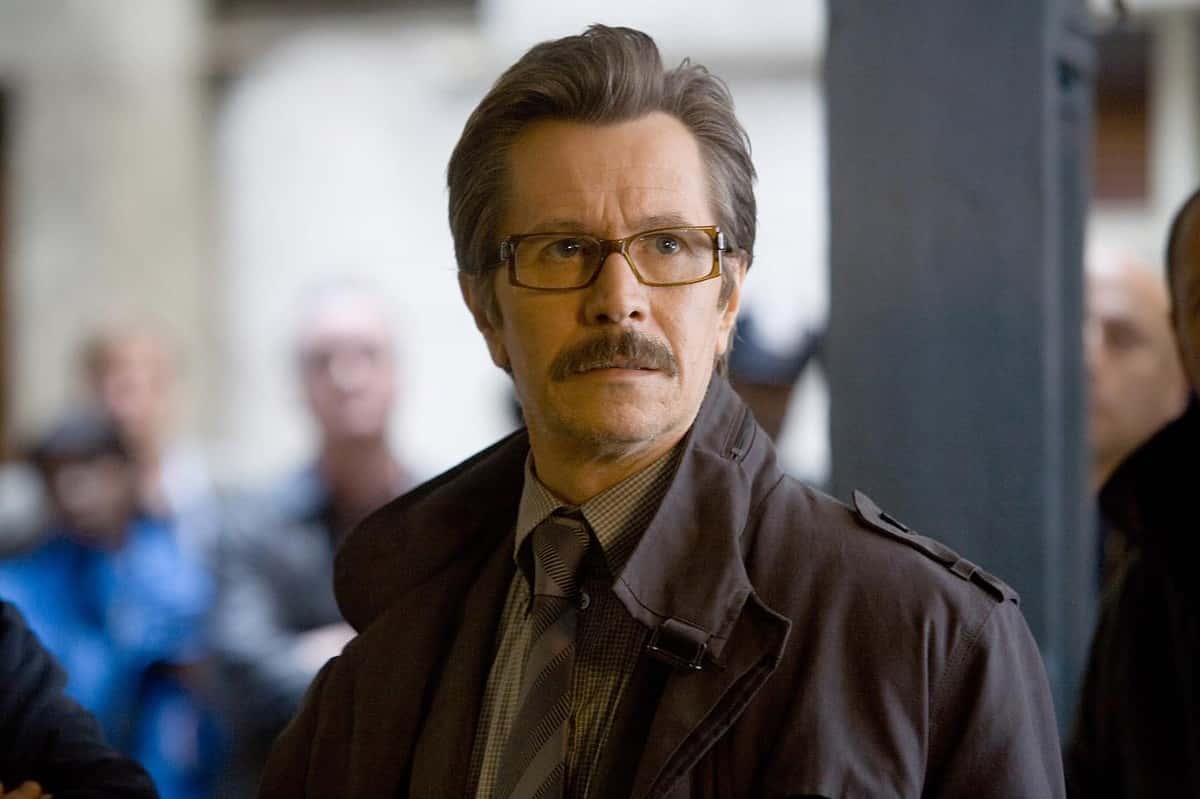
Gary Oldman (who made the list of our 30 best actors of all time) brings his chameleonic talents to the role of Lt. James Gordon, offering a fresh take on Batman’s ally within the Gotham City Police Department. Previous versions of Gordon tended to portray him already as Commissioner and established partner to Batman. But in Batman Begins, we meet Gordon earlier in his career as a noble detective trying to make a difference in a police force riddled with organized crime.
This younger Gordon provides crucial assistance to Batman as the vigilante first emerges to combat crime and corruption in Gotham. Oldman shows us Gordon’s own frustrations with the ineffectiveness of the proper channels, planting seeds that suggest why Gordon would ultimately condone Batman’s extralegal approach. We get a sense of how the two outsiders recognize one another’s drive for justice and a mutual desire to save Gotham from itself.
Oldman disappears into the role with none of the flashy theatricality from some of his other work. His haggard face and glasses perfectly capture Gordon’s dogged determination amidst a soul-sucking bureaucracy. In subtle ways, Oldman suggests Gordon’s complicated inner life and his hope that Batman represents the city’s redemption.
It’s a more restrained take compared to some past portrayals, but also more grounded and human. Gordon emerges as an indispensable secondary protagonist, laying the groundwork for his later formal partnership with the Dark Knight.
Cillian Murphy as Dr. Jonathan Crane (aka Scarecrow)
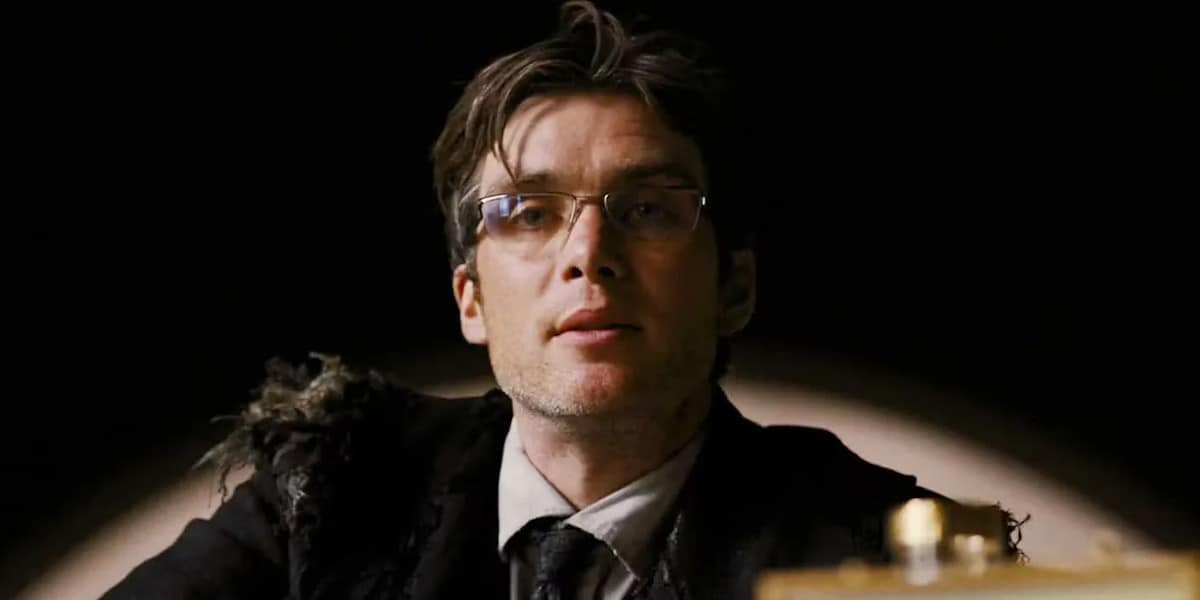
Though not the main villain, Cillian Murphy makes an indelible impression as Dr. Jonathan Crane/Scarecrow, representing a compelling secondary antagonist and threat. Murphy portrays Crane as a corrupt psychologist who secretly develops fear-inducing toxins to exploit and weaponize phobias. With his gaunt features and icy stare, the actor captures Crane’s chilling ruthlessness hidden beneath a veneer of bureaucratic professionalism.
Once Crane adopts his Scarecrow persona, Murphy fully inhabits the role with creepy theatricality. His ragged sack mask and taunting persona frighteningly embody the character’s obsession with human terror. Murphy presents Scarecrow as a maniacal and twisted mirror image of Batman – another masked alter ego weaponizing fear, albeit for malevolent purposes rather than justice.
Murphy’s Scarecrow distinguishes himself through the actor’s understated menace and grim delight. His spare lines drip with ironic contempt for humanity’s frailty. This dynamic villain clashes perfectly with Bale’s brooding Batman, providing an early test for the fledgling hero to overcome his own fears.
Liam Neeson as Henri Ducard (Ra’s al Ghul)
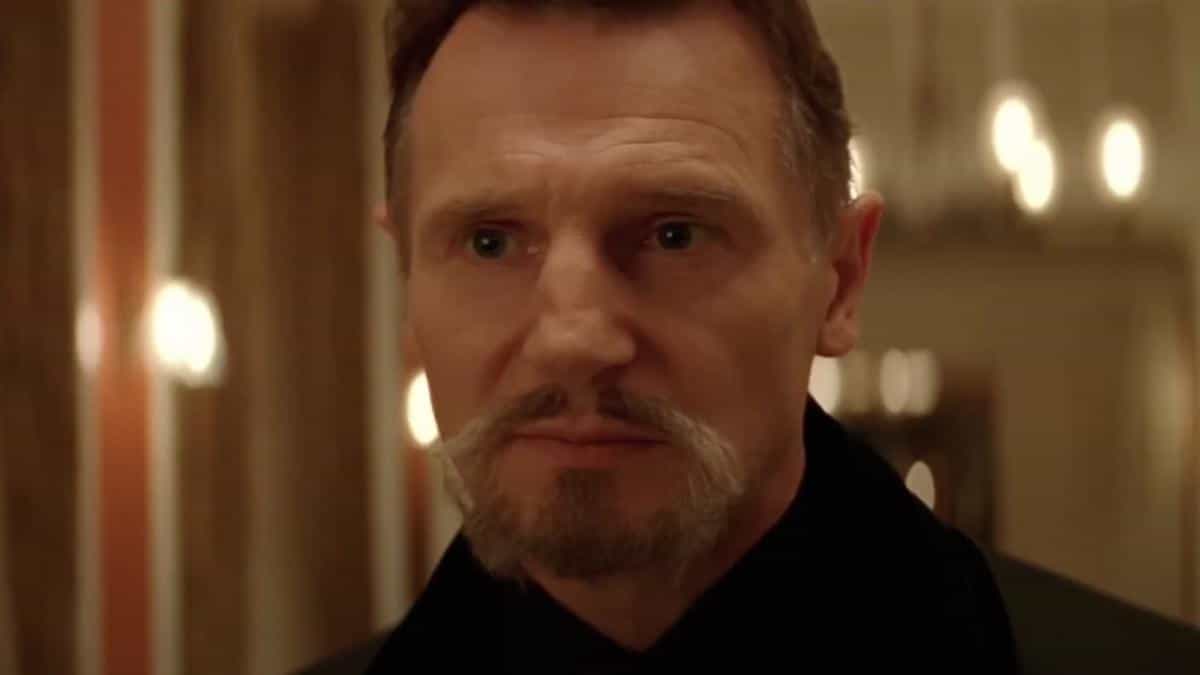
Liam Neeson brings an undeniable complexity to the role of Ra’s al Ghul, the enigmatic leader of the League of Shadows. Introduced as Ducard, Bruce’s mysterious mentor, Neeson lends the character a sophisticated air of moral ambiguity. We believe Ducard genuinely wants to recruit Bruce to the League’s righteous crusade against human corruption. But when Ducard is revealed to be Ra’s al Ghul, Neeson shifts to portray the character’s chilling extremism and unwavering conviction.
Casting an actor of Neeson’s stature in Batman Begins was a brilliant move to elevate Ra’s al Ghul above a mere stock villain. Neeson’s charisma and emotional depth make Ra’s feel like a fully realized character with his own coherent philosophy that happens to directly conflict with Batman’s. We understand why Bruce would initially be seduced by Ra’s worldview, making his turn feel like a genuine betrayal rather than a contrived twist.
In weaker hands, Ra’s could have been cartoonish or one-dimensional. But Neeson makes him a worthy adversary, showcasing the dueling perspectives on justice and vengeance that will continue to haunt Bruce throughout his career. The tense philosophical conflict between hero and villain makes their final battle emotionally resonant in a way most comic book climaxes are not.
Christian Bale as Bruce Wayne
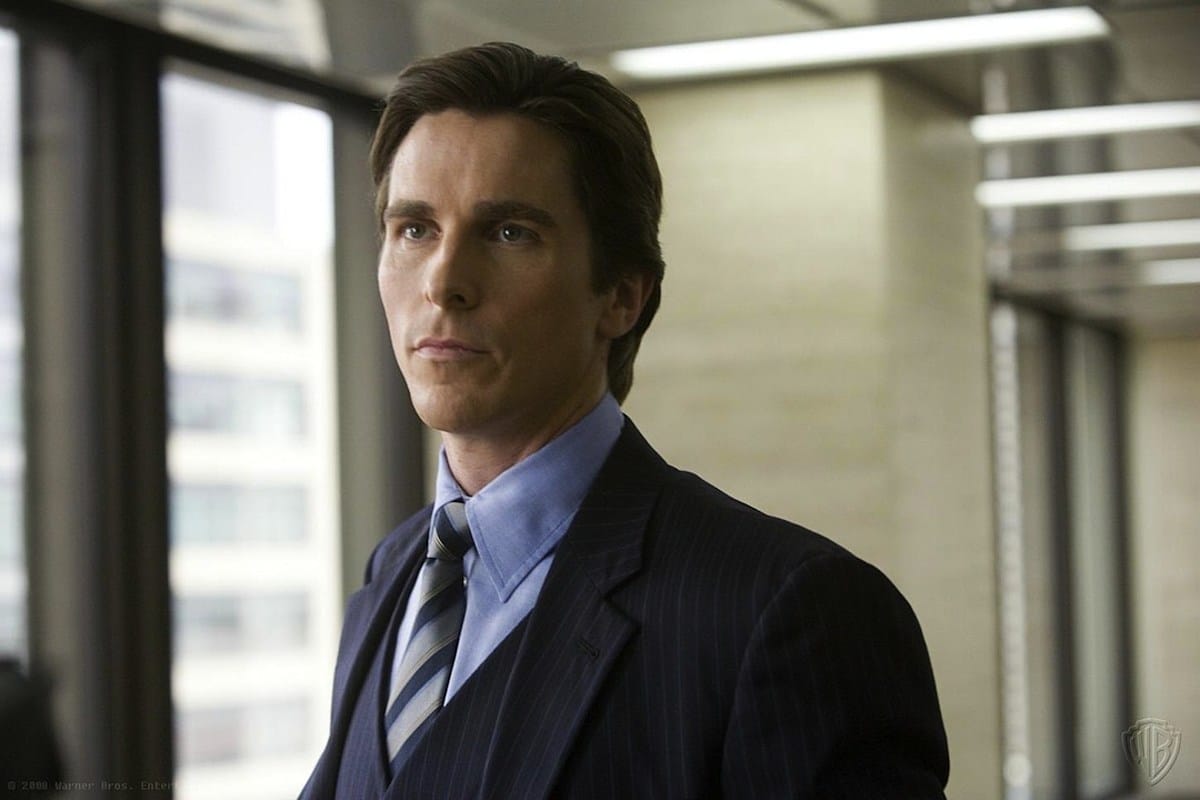
Of course, the casting that makes or breaks any Batman adaptation is Bruce Wayne/Batman himself, and Christian Bale stands out as the definitive live-action Dark Knight. Bale perfectly captures the dual nature of the character, portraying both the billionaire playboy facade Bruce shows the world and the brooding, tormented soul within.
As Bruce Wayne, Bale draws on his patrician good looks and charm to convincingly portray the superficial philandering image Bruce deliberately projects. This is what you get if Patrick Bateman was secretly a superhero. Yet, in private moments, Bale reveals the haunted vulnerability behind the mask, a man still defined by the childhood trauma of his parent’s murder.
When finally becoming Batman, Bale undergoes a striking transformation. His imposing physicality pairs with a deep, raspy voice that captures Batman’s intimidating presence. This layered duality makes Bale feel like the complete embodiment of the icon.
But even as Batman, glimpses of humanity shine through Bale’s performance. We understand the anger that fuels his crusade but also the underlying pain and unwavering morality. Bale makes Batman feel like a real flesh-and-blood person rather than just an imposing symbol, grounding even his most larger-than-life exploits.
Overall, Bale redefined Batman for a generation, combining mythic gravitas with emotional depth in all his scenes as both Bruce Wayne and the Dark Knight. His commanding yet nuanced performance remains the gold standard for capturing Batman’s complex essence.
Other Batman Begins cast members include Katie Holmes as Rachel Dawes, Ken Watanabe as Ra’s Al Ghul, Tom Wilkinson as Carmine Falcone, Linus Roache as Thomas Wayne, and Mark Boone Junior as Flass.
In the end, the magic of Batman Begins comes down to Christopher Nolan’s stellar casting. He assembled a perfect ensemble, from established prestige actors to emerging talents, who all committed completely to grounded, human portrayals even amidst the fantastical comic book world. Bale, Caine, Freeman, Oldman, Murphy, Neeson – Nolan coaxed iconic interpretations of these beloved characters out of his cast. In the end, these talents came together to deliver what many fans still consider the ultimate live-action version of the Caped Crusader.
What are your thoughts on the Batman Begins cast? Do you think Cillian Murphy should return for a solo Scarecrow origin film?

